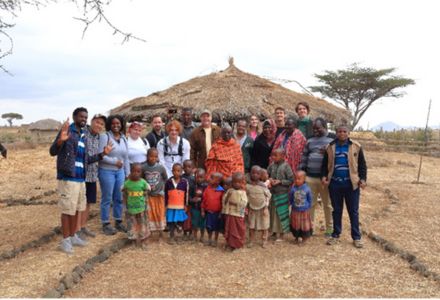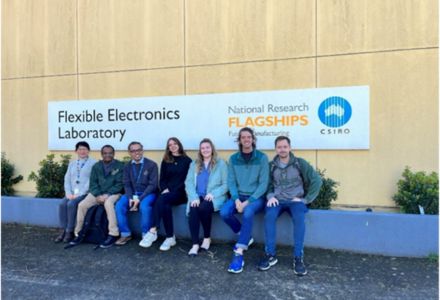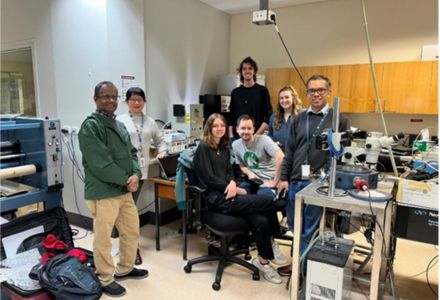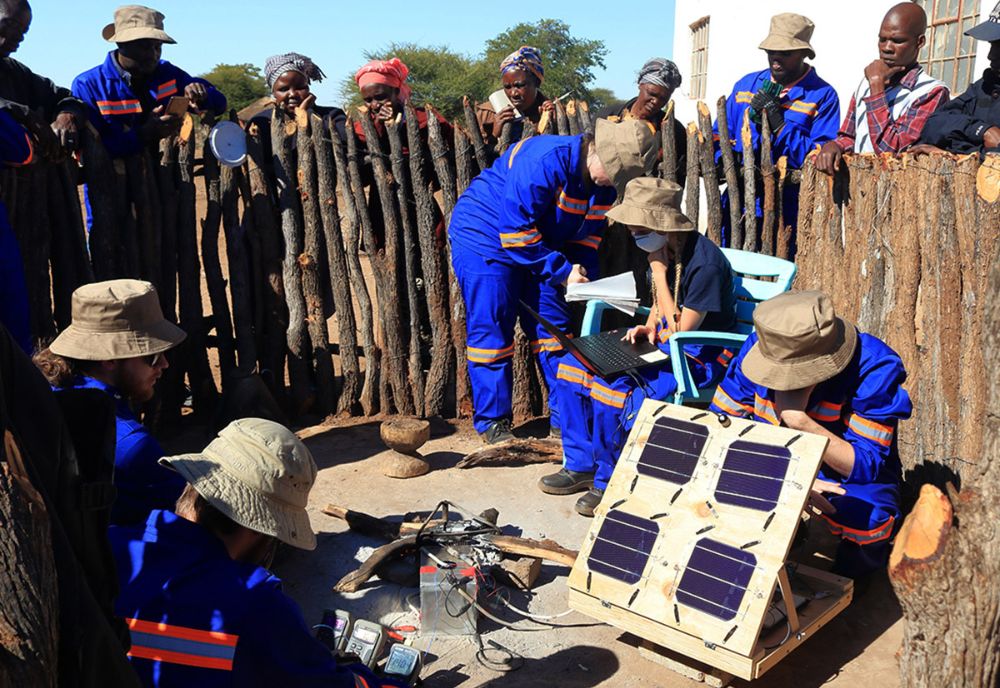
USF students and Dr. Sarath Witanachchi pose for photo with residents in rural African community. (Photo courtesy of Sarath Witanachchi)
Under a National Science Foundation (NSF) supported grant, a team of researchers from the USF College of Arts and Sciences Department of Physics have been engaged in a multi-year research project to develop a portable renewable energy source for people living in rural sub-Sahara Africa.
Dr. Sarath Witanachchi, chair and professor in the physics department, is the principal investigator for this project, of which he is leading several groups of students through African countries, including Botswana and Tanzania, to develop and distribute a renewable energy source to rural communities.
“Most households receive electricity via electrical wiring connected to a supply network. While these networks are prevalent in the developed world, for some of the developing countries, especially in Africa, these networks are limited to only large cities,” Witanachchi said. “In Africa close to 70% of the population does not have access to electricity, as the majority live in rural areas. So, the only possibility of providing electricity to these areas is generating electricity locally. While generators run by fossil fuels can provide portable power, solar energy harvesting and charging batteries as a portable source is the most economical approach to providing electricity to rural areas in Africa.”

USF students and Dr. Sarath Witanachchi sit in front of the flexible electronics laboratory in Australia. (Photo courtesy of Sarath Witanachchi)
The project, which began in 2019, was put on hold in 2020 and 2021 due to the COVID-19 pandemic. Upon resumption in the summer of 2022, a group of eight students traveled to Tanzania to continue to the project.
Since understanding the cultural norms within tribal regions of Tanzania is important for introducing this technology to tribes, two students from the Department of Sociology and Interdisciplinary Social Sciences were also included in the group, as well as sociology professor Dr. Frank Biafora to act as a mentor to the social science students.
Students also traveled to Australia in the summer of 2023 to learn about a new screen-printing technology which is able to print flexible solar panels, which are ideal for mounting on basic huts, which make up the majority of residential dwellings in rural sub-Saharian Africa.
“Through this grant, we have a collaboration with the Commonwealth Scientific and Industrial Research Organization (CSIRO), where researchers have developed a screen-printing technology to fabricate a new generation of flexible solar devices,” Witanachchi explained. “So, a group of four students traveled to Australia to test the solar-thermal hybrid energy harvesting concept with the cells fabricated by the group. The USF group demonstrated that the hybrid concept can yield much higher energy harvesting capability than a solar cell alone.”
Witanachchi plans to continue the collaboration to improve the yields, so these cells can be tried out in Africa.

Research team visits the Australian lab that is making flexible solar panels. (Photo courtesy of Sarath Witanachchi)
He also shared that he plans to return to Botswana or Tanzania in 2024 with a group of four to six students to revisit the same tribal villages to install flexible solar cells and test the hybrid energy harvesting technology.
“The long-term plan is to seek further funding to develop several units based on the prototype device that could provide electricity to some of the rural villages in Africa,” Witanachchi said.
“In addition to gaining scientific knowledge, the cultural experience gained by the students through interactions with the tribal communities and working with students in Botswana and Tanzania have been invaluable,” he said. “While engaging in research in Africa and Australia, students were also able to visit some of the UNESCO Heritage sites such as Serengeti National Park, Ngorongoro crater, and the Great Barrier Reef.”
